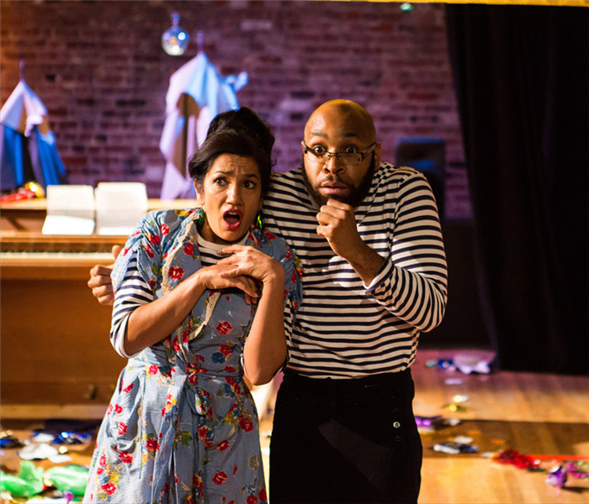Translate Page

What strikes you most about the set? The brightly colored paper everywhere, like a gift bag just exploded? The rickety old piano in the back, like Miss Kitty is going to saunter out of her saloon and sing you a tune?
And what about the three performers? Do you remember their funny scenes, when they're acting like cowboys? Or are you lingering on their contemplative moments, when it seems like they're feeling something poignant that they're not quite ready to share?
Then there's the big piece of butcher paper that gets unrolled across the room about halfway through the show. You know… the one with the Greek writing on one end and the sketches of mountain ranges on the other. How does that sit with you?
No matter how you respond to those questions, your answers are absolutely correct. That's at least half the point of Target Margin Theater's production of Reread Another, a short play by Gertrude Stein, the expat American genius of the early twentieth century. Her writing confounded our notions of form, meaning, and content, and this staging, which runs through October 17 at the Brick, wants us to feel the same thrilling uncertainty.
"There's no thread that we're following in terms of action or narrative or even characters," says David Herskovits, who's both the director of Reread Another and the artistic director of Target Margin. "There are just things that are out there in the world around you."
In other words, the play is a collection of short scenes that may or may not be connected, depending on how we choose to look at them.
"You don't have to understand it to get it," Herskovits says. "Something about love, something about loss, something about politics and France and America in that moment between the wars. It's all sprinkled in there. Stein wants to deliver the story without telling the story. For her, telling the story point by point by point is very dull. Even without quite knowing what the story is, you know there is a story, and she just wants you to get it."
Indeed, this 50-minute collection of vignettes does eventually make a strange kind of sense. The chaotic moments of comedy, the lightly goofy bits, and the lovely images all coalesce. And if they mean something different to every audience member who sees them… well… that's fine. "We want to make stories of things, and the tension that happens when the audience is constantly reinterpreting the story is exciting to me," says Herskovits. "In a certain way, you're writing the play."
But what about the people performing the play? Don't they have to make some concrete decisions about what they're putting on stage? After all, Stein's original script is just paragraphs of text divided into scenes. There's no indication of who says what, how many actors are involved, or where any particular moment is located. How does the Target Margin team interpret the material for performance without creating a production that leaves nothing to the audience's imagination?
"That's the heart of what I'm worrying about every day," Herskovits says. "You do [the scenes] a lot. You talk to everybody. You consider what they say, and then at the end, you just do what feels right."
In other words, Herskovits has been asking his cast members to figure out what the material means to them, then shaping their responses – and his own – into the finished show.
And if you think that sounds like what happens in any rehearsal, then you're right. Because really, every script requires both the artists and the audience to make their own sense of the material. It's just that Stein's play puts all that decision making in the foreground, instead of hiding it behind a traditional story.
Herskovits wants to make that process as much fun as possible. "Especially with work that is rigorous and challenging in this way, it's hugely important for me to give the audience lots of ways in – moments they can enjoy, pleasures that are simple," he says. "There has to be enough of that stuff so that you can feel engaged, but there also has to be enough of the stuff that makes you feel like you can't quite put it all together. You still have to do some of the work, but you can have a good time while you do it."
---
TDF MEMBERS: We've recently offered discounted tickets for this show. Click here to see all the available member discounts.
Photo by Marina McClure. Pictured L to R: Purva Bedi and Ugo Chukwu.